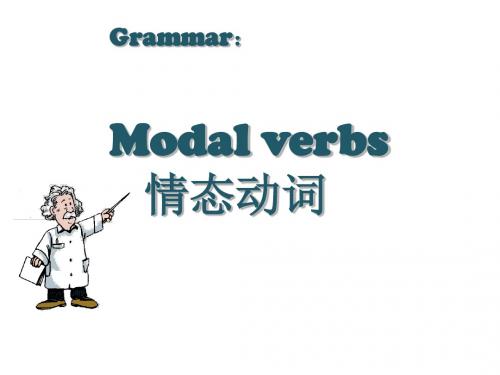情态动词公开课课件
合集下载
情态动词讲解ppt课件

A. may B. might C. could
D. must
10
may, might, can, could
表示猜测
➢ 1. They (can/might) ___m__ig_h__t___be away for the
weekend but I’m not sure.
表示许可
➢ 2. You (may/might) __m__a_y_____leave now if you
1.A computer ____ think for itself; it must be told what to do.
A. can’t B. couldn’t C. may not D. might not
1.I thought you ________ like something to read, so I have brought you some books.
2.表示推测时,could不是过去式,只是语气 更委婉;若是推测已发生的事或过去的情况, 用can/could have done
7
3.can和be able to辨析 can(could)和be able to都可以表示能力,意思上没有区别。 但can只有现在式和过去式,而be able to则有更多的形式。 如:
3
Ⅲ 情态动词的语法特征 1) 情态动词不能表示正在发生或已经
发生的事情,只表示期待或估计某事的 发生。
2) 情态动词除ought 和have 外,后 面只能接动词原形。
3) 情态动词没有人称,数的变化,即 情态动词第三人称单数不加-s。
4) 情态动词没有非谓语形式,即没有 不定式,分词,等形式。
1.It may rain this afternoon. 2.She might come to join us this afternoon. 3.I suppose he might have missed the train.
情态动词讲解精ppt课件

例句
will/would
详细描述:will 表示现在的意愿或 预测,would 表示过去的或虚拟 的意愿或预测。
1. I will help you with your project.(我会帮助你完成你的项 目。)
总结词:表示意愿或预测
例句
2. They would have gone to the party if they had known about it earlier.(如果他们早点 知道,他们就会去参加聚会。)
表示意愿
情态动词+动词原形,如 would like to go,表示 某人想要去。
形式变化
基本形式
情态动词的基本形式包括 现在时、过去时和将来时 。
过去式
情态动词的过去式通常是 在基本形式后面加-d或ed,如could have done 、should have done等。
将来时
情态动词的将来时通常是 在基本形式后面加-will或shall,如will be able to 、shall have to等。
may与might的区别与联系
总结词
may表示现在的许可或可能性;might表示过去的可能性或许可。
详细描述
may用于肯定句中,表示许可或可能性,例如“You may use this room.”(你可以使用这个房间。 )“The book may be in the library.”(这本书可能在图书馆里。)might表示过去的可能性,常 用于过去时态的句子中,例如“He might come tomorrow.”(他明天可能来。)
未必、很难说
She might not agree with us.
表示虚拟语气
will/would
详细描述:will 表示现在的意愿或 预测,would 表示过去的或虚拟 的意愿或预测。
1. I will help you with your project.(我会帮助你完成你的项 目。)
总结词:表示意愿或预测
例句
2. They would have gone to the party if they had known about it earlier.(如果他们早点 知道,他们就会去参加聚会。)
表示意愿
情态动词+动词原形,如 would like to go,表示 某人想要去。
形式变化
基本形式
情态动词的基本形式包括 现在时、过去时和将来时 。
过去式
情态动词的过去式通常是 在基本形式后面加-d或ed,如could have done 、should have done等。
将来时
情态动词的将来时通常是 在基本形式后面加-will或shall,如will be able to 、shall have to等。
may与might的区别与联系
总结词
may表示现在的许可或可能性;might表示过去的可能性或许可。
详细描述
may用于肯定句中,表示许可或可能性,例如“You may use this room.”(你可以使用这个房间。 )“The book may be in the library.”(这本书可能在图书馆里。)might表示过去的可能性,常 用于过去时态的句子中,例如“He might come tomorrow.”(他明天可能来。)
未必、很难说
She might not agree with us.
表示虚拟语气
情态动词专题知识公开课获奖课件

第7页
②在予以他人许可时,常用can,但有时也用may。不能用 might。
-May I play basketball this afternoon? 今天下午我可以打篮球吗? -Yes,you may. 行,可以。
第8页
(2)表达也许性 may和might表达也许性时,可以对目前、过去或未来进行 推测。 Peter may e with us tonight,but he isn't sure yet. 彼得今晚也许和我们一起来,但他还没确定。 He might be studying in the classroom. 他也许正在教室里学习。
用于必定句,表示对
taken the other road.It might have
过去没有做某事遗憾,意思 been quicker.可能我们本应走另一
should/ou 为“原来能够……(但实际 条路,那样可能更加快些。
第17页
(3)用于法律、公约、约定等正式条文,重要用于第三人称。 Students shall remain in their seats until all the papers have been collected. 试卷所有收回后学生方可离开座位。
第18页
5. will和would使用措施 作情态动词will,would与作助动词will,would多种形式相 似。 (1)表达自愿做或积极提出做什么,如意志、愿望或决心等。 would用于过去状况。
第14页
The TV set is broken. I have to buy a new one. 电视机坏了。我不得不再买台新。 The students will have to know how to use the puters. 学生将必须理解怎样使用电脑。 He had to go,because his mother was ill. 他不得不离开,由于他母亲病了。
②在予以他人许可时,常用can,但有时也用may。不能用 might。
-May I play basketball this afternoon? 今天下午我可以打篮球吗? -Yes,you may. 行,可以。
第8页
(2)表达也许性 may和might表达也许性时,可以对目前、过去或未来进行 推测。 Peter may e with us tonight,but he isn't sure yet. 彼得今晚也许和我们一起来,但他还没确定。 He might be studying in the classroom. 他也许正在教室里学习。
用于必定句,表示对
taken the other road.It might have
过去没有做某事遗憾,意思 been quicker.可能我们本应走另一
should/ou 为“原来能够……(但实际 条路,那样可能更加快些。
第17页
(3)用于法律、公约、约定等正式条文,重要用于第三人称。 Students shall remain in their seats until all the papers have been collected. 试卷所有收回后学生方可离开座位。
第18页
5. will和would使用措施 作情态动词will,would与作助动词will,would多种形式相 似。 (1)表达自愿做或积极提出做什么,如意志、愿望或决心等。 would用于过去状况。
第14页
The TV set is broken. I have to buy a new one. 电视机坏了。我不得不再买台新。 The students will have to know how to use the puters. 学生将必须理解怎样使用电脑。 He had to go,because his mother was ill. 他不得不离开,由于他母亲病了。
情态动词ppt课件市公开课获奖课件省名师示范课获奖课件

I don’t like this TV set. We must buy a new one. There was no more bus. They had to walk home.
• (2) must旳否定形式mustn’t表达禁止, 意思是“不能,不许”。例如:
• (2023上海春)When I was young, I was told that I ______ play with matches
B. it is used to
• C. it was used to
D. it used to be
• 【答案】A D
(三)情态动词+have done
• must表达对某人某事旳猜测;对过去发生旳 事情作肯定判断用must have done
There is nobody here. They must have all gone home.
• can用于肯定句中表达一种理论上旳可能性, 并不牵涉是否真旳会发生;
• The road can be blocked. • could用于肯定句中,语气比can更弱。
• (4)may (not) / might (not)体现一种不太把 握旳推测,意为“或许,可能”;might旳 语气比may较婉转.
• A. might B. should C. could D. would
• 【答案】D
• (2) would表达过去倾向性或习惯性旳动作。 used to 也有这一使用方法,但used to即 可用来体现过去旳习惯性旳动作,也可用 来表达过去旳状态。例如:
• ① (NMET1996上海)When he was there, he ___ go to that coffee shop at the corner after work every day.
• (2) must旳否定形式mustn’t表达禁止, 意思是“不能,不许”。例如:
• (2023上海春)When I was young, I was told that I ______ play with matches
B. it is used to
• C. it was used to
D. it used to be
• 【答案】A D
(三)情态动词+have done
• must表达对某人某事旳猜测;对过去发生旳 事情作肯定判断用must have done
There is nobody here. They must have all gone home.
• can用于肯定句中表达一种理论上旳可能性, 并不牵涉是否真旳会发生;
• The road can be blocked. • could用于肯定句中,语气比can更弱。
• (4)may (not) / might (not)体现一种不太把 握旳推测,意为“或许,可能”;might旳 语气比may较婉转.
• A. might B. should C. could D. would
• 【答案】D
• (2) would表达过去倾向性或习惯性旳动作。 used to 也有这一使用方法,但used to即 可用来体现过去旳习惯性旳动作,也可用 来表达过去旳状态。例如:
• ① (NMET1996上海)When he was there, he ___ go to that coffee shop at the corner after work every day.
情态动词语法讲解PPT课件

2表示“许可”和“不许”
a)请求对方“许可”可用can, could, may, might.
may/might较正式,could/might较委婉
表示给予“许可”通常用can/may,而不用 could/might
Could I use your phone? Yes, of course you can. Might I trouble you for a light? You may indeed.
表示将来的“必须”,常用have to的一定 形式(will/shall have to) 比较:
•We must do it again.(表示现在)
•We’ll have to do it again.(表示将来)
•表示过去的“必须”,常用had to
•I had to leave at six yesterday.
•They must be home by now.(他们现在一定到家了)
will/would表示“推测”可有三种情况
1)对特定事态的推测
A: Who’s that man over there? B: That will be George, no doubt. C: That would be George, I except.
• Can they have missed the bus?
• Yes, they may have.
may not重音落在助动词上,表示 “不可能”,重音落在否定词上,表 示“不许可” , 比较:
•He may not go tomorrow.
•He may not go tomorrow.
•所以在书面语中,表示“不可能” 常用can’t
我的公开课情态动词课件

2. —What’s the name of the book? —Khulaifi. _________ I spell it for you? A. Shall B. Would C. Can D. Might
情态动词表必要性
• must • need
高考真题演练
must 表“必须”
mustn’t 禁止
A. might B. must C. would D. can
3. What do you mean, there are only ten tickets? There ______ be twelve.
A. should B. would C. will D. shall
4. It is usually warm in my hometown in March, but it _____ be rather cold sometimes.
1. 不必须
don’t have to needn’t do
don’t need to
2. must还可表示“偏偏、偏要” e.g. Must you make so much noise?
• You ___ buy a gift, but you can if you want to.
• must
1. 常用于否定句或疑问句。 e.g. You can’t be hungry already — you had
lunch only two hours ago!
2. can用于肯定句中表示理论上的可能性,并不 牵涉是否真的会发生
e.g. You can hurt yourself if you play in the street.
A. must B. can C. should D. would
情态动词-完整版PPT课件
情态动词 modal verbs
1.情态动词的用法特点
1)情态动词 除 ought 和 have 外,后面只能 接不带to 的不定式。 2)情态动词没有人称,数的变化,即情态动 词第三人称单数不加-s。 3)情态动词没有非谓语形式,即没有不定式, 分词等形式。
can could may might shall should must will would ought to
have to dare need used to
表示推测
情态动词
不表示推测
2.表示推测——情态动词的重要用法.
情态动词
对将来
对现在
对过去
m肯ust/定sho的uld 推测
+ V. + V. + have done
常见must be + be doi定的推测 can’t, couldn’t
疑问的推测
can, could
+ V.
+ V.
+ have done
+ be doing
可以用not表示“可能不”
+V.
+ V.
+ have done
+ be doing
+ V.
+ V.
+ have done
+ be doing
不同的“肯定”程度可按下列层次排列: He is at home. (事实) He must be at home.(非常肯定的推断) He ought to be at home.(很可能) He could be at home.(很可能) He may be at home.(仅仅可能而已) He might be at home.(或许, 非常不确定) He might not be at home.(也许不在家) He may not be at home. (比might可能) He couldn’t be at home.(很可能不在家) He can’t be at home.(一定不在家)
1.情态动词的用法特点
1)情态动词 除 ought 和 have 外,后面只能 接不带to 的不定式。 2)情态动词没有人称,数的变化,即情态动 词第三人称单数不加-s。 3)情态动词没有非谓语形式,即没有不定式, 分词等形式。
can could may might shall should must will would ought to
have to dare need used to
表示推测
情态动词
不表示推测
2.表示推测——情态动词的重要用法.
情态动词
对将来
对现在
对过去
m肯ust/定sho的uld 推测
+ V. + V. + have done
常见must be + be doi定的推测 can’t, couldn’t
疑问的推测
can, could
+ V.
+ V.
+ have done
+ be doing
可以用not表示“可能不”
+V.
+ V.
+ have done
+ be doing
+ V.
+ V.
+ have done
+ be doing
不同的“肯定”程度可按下列层次排列: He is at home. (事实) He must be at home.(非常肯定的推断) He ought to be at home.(很可能) He could be at home.(很可能) He may be at home.(仅仅可能而已) He might be at home.(或许, 非常不确定) He might not be at home.(也许不在家) He may not be at home. (比might可能) He couldn’t be at home.(很可能不在家) He can’t be at home.(一定不在家)
情态动词全部ppt课件
A.must
B.would
C.should
D.might
19
• 翻译 • ----我能在这个房间抽烟吗? .
---- 可以。 ---- 不行,… ----Might/ May I smoke in this room?
---- Yes, you can.
---- No, you mustn’t
20
rule.
(威胁)
26
Shall 决心、承诺、警告、命令 you \he\she\they shall…..(二三人称陈述)
When the chairman turns up, nobody shall say a word. 命令 Students shall remain in their seats until the papers have been
28
5. should
1. should表示义务、职责、劝告,意 为 “应该”。
eg: You should keep your promise. Students should respect teachers.
29
2)表示说话人_惊_讶______等特殊情感。
It’s surprising that Mary should not know Lei Feng.
3.must, need没有时态,但有些情态动词如can、 may,will,have to有一般式和过去式的变化。
4. 情态动词不能单独做谓语,必须和实义动词原形 一起构成谓语。
3
情态动词的“时态”形式并不是时间区 别的 主要标志, 不少情况下, 情态动词的 现在式 形式和过去式形式都可用来表 示现在时 间、过去时间和将来时间。
情态动词精品课件PPT课件
第22页/共52页
• It is usually warm in my hometown in March,but it can be rather cold sometimes.
• 我的家乡在三月份通常很暖和,但有时候也会相当冷。 • Mr.Bush is on time for ever ything.How can it be that he was late for the
meeting? • 布什先生做什么事情都很准时,他怎么可能开会迟到呢? • He can't be in the classroom ,for the light has been turned off. • 他一定不在教室里,因为灯已关了。
第23页/共52页
• 2.may用于肯定句中可以用来表示推测,意为“可能”;用于否定句中也可以表示 推测,may not意为“可能不”,表示一种不太确定的语气。may在疑问句中一般不 表示推测。
You'd better not. 等)不,你不可以用。
第11页/共52页
• 3.must和have to的用法 • must表示“必须、应该”。否定形式must not(mustn't)表示“不应该、不许可、
不准、禁止”等。在回答must的问句时,否定式常用need not(needn't)或don't have to表示“不必”,而不用must not,因为must not表示“禁止”。must表 示“一定、必定”等推测意义时,一般只用在肯定句中。 • The work must be finished as soon as possible. • 这项工作必须尽快完工。
第21页/共52页
• 热点考向二 情态动词表“推测”的用法 • 表示对目前或将来情况的推测往往用“情态动词+动词原形”这种结构。 • 1.can用于肯定句中表示可能性,意为“有时会”;用于疑问句中可以表示推测,意
• It is usually warm in my hometown in March,but it can be rather cold sometimes.
• 我的家乡在三月份通常很暖和,但有时候也会相当冷。 • Mr.Bush is on time for ever ything.How can it be that he was late for the
meeting? • 布什先生做什么事情都很准时,他怎么可能开会迟到呢? • He can't be in the classroom ,for the light has been turned off. • 他一定不在教室里,因为灯已关了。
第23页/共52页
• 2.may用于肯定句中可以用来表示推测,意为“可能”;用于否定句中也可以表示 推测,may not意为“可能不”,表示一种不太确定的语气。may在疑问句中一般不 表示推测。
You'd better not. 等)不,你不可以用。
第11页/共52页
• 3.must和have to的用法 • must表示“必须、应该”。否定形式must not(mustn't)表示“不应该、不许可、
不准、禁止”等。在回答must的问句时,否定式常用need not(needn't)或don't have to表示“不必”,而不用must not,因为must not表示“禁止”。must表 示“一定、必定”等推测意义时,一般只用在肯定句中。 • The work must be finished as soon as possible. • 这项工作必须尽快完工。
第21页/共52页
• 热点考向二 情态动词表“推测”的用法 • 表示对目前或将来情况的推测往往用“情态动词+动词原形”这种结构。 • 1.can用于肯定句中表示可能性,意为“有时会”;用于疑问句中可以表示推测,意
情态动词(共43张PPT)
A.Must; mustn't
B.Will; couldn't
C.May; can't
( C ) It's really hot in the room.You'd better
the
windows. A.not to close B.don't close C.not close
(B )
—You
drive after drinking, Simon.
—You're right.I'll take a taxi.
A.wouldn't B.shouldn't C.ought to
二、用恰当的情态动词填空。
Simon, you mmuussttnn''tt play with the knife.You mmayay
在回答以 may 提问的问句时,肯定回答一般可仍用 may 或 Yes, please./Certainly./Sure./Of course.否定回答根据说话人的语气 由强到弱分别选用: mustn't/can't/may not。 —May I watch TV? 我能看电视吗? —No, you mustn't.You must play the piano first.不,你禁止看, 你必须先弹钢琴。
need 的基本用法 意为“需要;必要”,作情态动词时常用于否定句和疑问句中。 You needn't hand in your homework tomorrow.你明天不需要 交你的作业。 Need I attend the meeting this afternoon? 我需要今天下午参 加会议吗?
- 1、下载文档前请自行甄别文档内容的完整性,平台不提供额外的编辑、内容补充、找答案等附加服务。
- 2、"仅部分预览"的文档,不可在线预览部分如存在完整性等问题,可反馈申请退款(可完整预览的文档不适用该条件!)。
- 3、如文档侵犯您的权益,请联系客服反馈,我们会尽快为您处理(人工客服工作时间:9:00-18:30)。
can/be able to 区别:
Edison always wondered why hens could hatch ( 孵) chickens
while he was not able to .
Question: Are the two modal verbs interchangeable ( 互换) ? If not, why?
2. She ____c_anspeak both English and French.
2.Obligation (
义务): I'm so tired! I have to do the training for at least 10 hours a day!
Although Liu Xiang is so gifted in hurdle race…
— Yes, you ___c_a_n./may / No, you ___c_a_n't/I'm afraid not
can/could :
3.表示惊异、怀疑、不相信的态度。(主 要用在否定句、疑问句或惊叹句中)
Can this be true?
He's such a nice person that
Learning English ____c_anbe difficult
.
__C__a_n__ I use your bike?
can/could:
2.在疑问句中,用could 可表示请 求,语气较委婉。
He asks if he ____cosmulodke here. — C_o_u_l_dI have the television on?
A.can B.may C.have to D.must
3.Certainty (
可能性) :
Although the chance of winning a
medal is small, I'll try my best!
Shi Dongpeng might win a medal
at the Olympic Games.
Rose —Sure. By the way, who is your favorite
sports star?
Jack —Liu Xiang, I should say.
Rose —Tell me something about him.
Jack —Well, maybe I can show you some photos.
1.Ability ( 能力):
Liu Xiang can run the 110m
hurdle race within 13 seconds.
can/could:
1. can 一般表示与生俱来的能力或 者一种客观可能性, 还可以表示请 求和允许 。
Man can not live without air .
very uncertain
ห้องสมุดไป่ตู้
almost certain
might may could (can) should ought to will must
1.He _____ be at home . A.may B.might C.must
2.He _____ be at home,
for he
just called me from his home 15
he __c_a__n_'tcommit the crime
.
你Ho怎w 么ca会n 如yo此u b地e s粗o c心ar!eless!
can/could: 4. can never/can't……too 表示 “无论怎样…也不过分”,“越…越 好” 。
你过Ywoh马uile路cac的rno'时tss候ibneg再tt小ohoe心rcoa也ared不f.u为l 过。
can 表示与生俱来的能力或一种客观可能,而 be able to 更加强调通过后天的学习和努力获 得的能力,或者在某个客观的场合和背景下, 能做到的事情。
can/be able to 区别:
1.A big fire broke out in ABC hotel yesterday. Luckily, everyone ___w_a_s_a_bl_e_t_o run out of the building .
have to stay up late
to do so much homework and my mom
may allow me
to play computer games.
Jack —The best thing I think is that
I can have
more spare time to take exercise after class.
…yet he must work
hard to win the gold medal.
advisability
necessity
ought to/should
have to
must
Your mother brings you up and takes good care of you, so when she is old, you ___ look after her in return.
一. We use modal verbs to talk about:
1. Ability (能力) 2. Obligation (义务) 3. Certainty (可能性) 4. Permission (允许)
二.We also use modal verbs to:
5. Make requests (提出请求) 6. Make suggestions (提出建议) 7. Make offers (提供帮助) 8. Give advice (提出意见)
Jack —I have good news for you!
Rose —What?
Jack —The educational department has carried out
rules to reduce students' too much study load.
Rose —Really? If so, I don't
